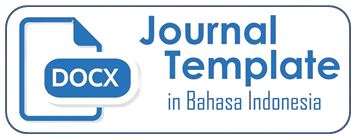PENERAPAN KONSELING KELOMPOK DENGAN TEKNIK SELF MANAGEMENT DALAM RANGKA PENGELOLAAN STRES AKADEMIK PESERTA DIDIK KELAS VIII SMP
DOI:
https://doi.org/10.22460/fokus.v2i6.3541Abstract
Tujuan dari penelitian ini yaitu untuk mengetahui apakah penerapan teknik self management dapat mengelola stres akademik peserta didik. Metode yang digunakan untuk penelitian ini yaitu Pendekatan kuantitatif, dengan Metode penelitian ini merupakan jenis quasi eksperimen dengan menggunakan model one control grup design, yaitu eksperimen atau pemberian treatment yang dilakukan pada kelompok kontrol dan kelompok eksperimen. Penelitan ini menyimpulkan bahwa hasil penelitian “penerapan konseling kelompok dengan teknik self management efektif dalam rangka mengelola stres akademik peserta didik kelas VIII D di SMPN 2 Batujajar, Kab.Bandung Barat â€, dapat disimpulkan bahwa stres akademik dapat direduksi melalui layanan konseling kelompok dengan self management. Berdasarkan hasil output diatas diketahui nilai sig.(2-tailed) adalah sebesar 0,000 < 0,05, maka HO ditolak dan Ha diterima. Dengan hasil perhitungan rata-rata skor stres akademik sebelum diberikan perlakuan adalah 131 dan setelah diberikan perlakuan teknik self management untuk mereduksi stres akademik pada peserta didik cenderung menurun dengan presentase 55%. Sehingga dapat disimpulkan bahwa ada perbedaan rata-rata antara hasil pretest dengan posttest yang artinya ada pengaruh dalam penerapan teknik self management  dapat mereduksi stres akademik pada peserta didik kelas VIII D di SMPN 2 Batujajar di Kab. Bandung Barat.
Kata Kunci : Stres akademik, Self management, konseling kelompok
References
Agolla, J. E & Ongori, H. (2009). An assessment of academic stress among undergraduate students: the case of university of Botswana. Educational Research and Review, 4(2), 63-70
Agragal, A., Garg, R., & Urajnik, D. (2010). Appraisal of school-based stressors by fourth-grade children: a mixed method approach. Creative Education, 1(3), 196-201
Azizah & Nurul, A. (2014). Program full day school dalam pengembangan kemandirian peserta didik kelas IV di SDIT Insan Utama Bantul. Fakultas Ilmu Pendidikan. Universitas Negeri Yogyakarta.
Baharudin.(2010).Pendidikan dan Psikologi Perkembangan.Jogjakarta:ArRuzz Media.
Basuki, S. (2009). Full day school, harus proporsional sesuai jenjang dan jenis sekolah:Jurnal pendidikan: Diakses 02 September 2019.
Briesch, A. M., Briesch, J. M., & Mahoney, C. (2014). Reported Use and Acceptability of Self-Management Interventions to Target Behavioral Outcomes. Contemporary School Psychology, 18(4), 222-231.
Briesch, A. M., & Daniels, B. (2013). Using Self-Management Interventions to Address General Education Behavioral Needs: Assessment of Effectiveness and Feasibility. Psychology in the Schools, Vol. 50(4).
Byrne,D.G,Davenport,S.C&Mazarnov,J. (2007).ProfilesOfAdolescentStress.The Developement Of The AdolescentStress Quistionaire(ASQ) Journal Of Adolescence.30.393-416.
Cole, C. L., & Bambara, L. M. (1992). Issues surrounding the use of self-management interventions in the schools. School Psychology Review.
Corey,Gerald.(1982).Theory and practice of group counseling.California:Brooks/Cole Publishing
Cornier WH & Cornier,L.S.(1985).Interviewing and change Strategies for helpers:Fundamental Skills and Cognitive Behavioral interventions, US: Brooks/Cole publishing.
Desmita. (2009). Psikologi Perkembangan Peserta Didik. Bandung: Remaja Rosdakarya
Essel, G & Owusu, P. (2017). Causes of Students Stress, its Effects on Their Academic Success, and Stress Management by Students. Thesis. Finlandia: Faculty of School of Business and Culture
Fatimah Siti,(2015). Efektivitas Konseling Kognitif-Prilaku Untuk Mereduksi Stres Akademik. Tesis . Universitas Pendidikan Indonesia
Fatmawati, (2018). Hubungan Antara Kejenuhan Belajar dengan Stres Akademik (Pada Siswa-Siswi Full Day School di SMPN 2 Samarinda). Jurnal, Volume 6, No. 4 : 704-712.
Furrer, C & Skinner, E. (2003). Sense of relatedness as a factor in children’s academic engagement and performance. Journal of Educational Psychology, 95(1), 148-162
Gaol, N. (2016). Teori Stres:Stimulus, Respons, dan Transaksional. Buletinpsikologi, vol. 24, No. 1,1-11.
Harsha, P.P. (2017). Family Environment and Academic Stress as Predictor of Depression in Adolescents. A Dissertation Submitted to Sikkim University
Hesketh, T., Zhen, Y., Lu, L., Dong, Z., Jun, Y., & Xing, Z. (2010). Stress and psychosomatic symptoms in Chinese school children: cross sectional survey. Journal of Arch Dis Child, 95, 136-140
Kanfer, F. H., & Gaelick-Buys, L. (1991). Self-Management Methods. In F. H. Kanfer & A. P. Goldstein (Eds.), Pergamon general psychology series, Vol. 52. Helping people change: A textbook of methods (pp. 305-360). Elmsford, NY, US: Pergamon Press.
Khan, A & Alam, S. (2016). Influence of academic stress on students self concept, adjustment and achievement motivation. Thesis for the Degree of Doctor of Philosophy in Psychology. Aligarg Muslim University, India.
Monica, M. A., & Gani, R. A. (2016). Efektivitas Layanan Konseling Behavioral Dengan Teknik Self-Management untuk Mengembangkan Tanggung Jawab Belajar Pada Peserta Didik Kelas XI SMA Al-Azhar 3 Bandar Lampung Tahun Ajaran 2015/2016. Jurnal Bimbingan dan Konseling (E-Journal), 3(2), 171-186.
Nurmaliyah, F. (2014). Menurunkan stres akademik peserta didik dengan menggunakan teknik self-instruction. Jurnal Pendidikan Humaniora, 2(3), 273-282
Nursalim, Mochamad. (2013), Strategi dan Intervensi Konseling.Jakarta: Akademia Permata.
Raufelder, D., Kittler, F., Braun, S. R., Latsch, A., Wilkinson, R. P., & Hoferichter, F. (2013). The interplay of perceived stress, self-determination and school engagement in adolescence. School Psychology International, 1-16. DOI: 10.1177/0143034313498953
Sangabakti, S.(2011). Strategi Bimbingan Kelompok Untuk meningkatkan Kemampuan Peserta didik Dalam Mengelola stres. Tesis.Bandung:Universitas Pendidikan Indonesia.
Sarafino, E. P & Smith, T. W. (2011). Health Psychology Biopsychosocial Interaction 7th Editon. United States of America: Wiley John Willy & Sons, Inc.
Sinha, K. U., Sharma, V., & Mahendra K. (2001). Development of a scale for assessing academic stress:a preliminary report. Journal of the Institute of Medicine, 23(1&2), 105-112
Sonia & Sarita. (2015). Academic stress among students: role and responsibilities of parents. International Journal of Applied Research, 1(10), 385-388
Southall, C. M., & Gast, D. L. (2011). Self-management procedures: A comparison across the autism spectrum. Education and training in Autism and developmental disabilities, 155-171.
Sugiyono. (2012). Metode Penelitian Kuantitatif, kualitatif dan R & D. Bandung: Alfabeta.
Wilks, S. E. (2008). Resilience amid academic stress: the moderating impact of social support among social work students. Advance in Social Work. 9 (2), 106-125
Yumba, W. (2008). Academic stress: A case of the undergraduate students. Dissertations.Institutionen for beteendevetenskap och larande













